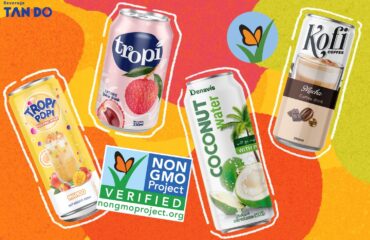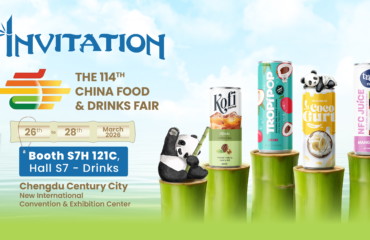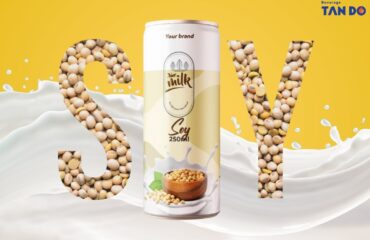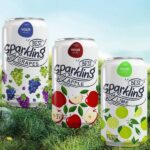Juice cane — once seen as a simple street refreshment — is fast becoming a strategic ingredient in the global beverage landscape. As consumers shift toward natural sweetness, cleaner labels, and traceable origins, sugarcane juice stands out as a sustainable and functional alternative to refined sugar bases.
In this essential industry guide, we’ll explore everything you need to know — from what sugarcane juice is, its nutritional and health benefits, and how it’s produced in Vietnam, to why it’s a profitable opportunity for global drink brands — and how Tan Do Beverage can help you bring this refreshing ingredient to market.
Discover Juice Cane — The Sweet, Sustainable Hero Behind Modern Drinks
Juice cane refers to the juice extracted from fresh sugarcane stalks — a tall tropical grass known for its naturally sweet sap. The stalks are crushed or pressed to release the juice, which can be enjoyed fresh or processed into bottled beverages, concentrates, or frozen formats for export.
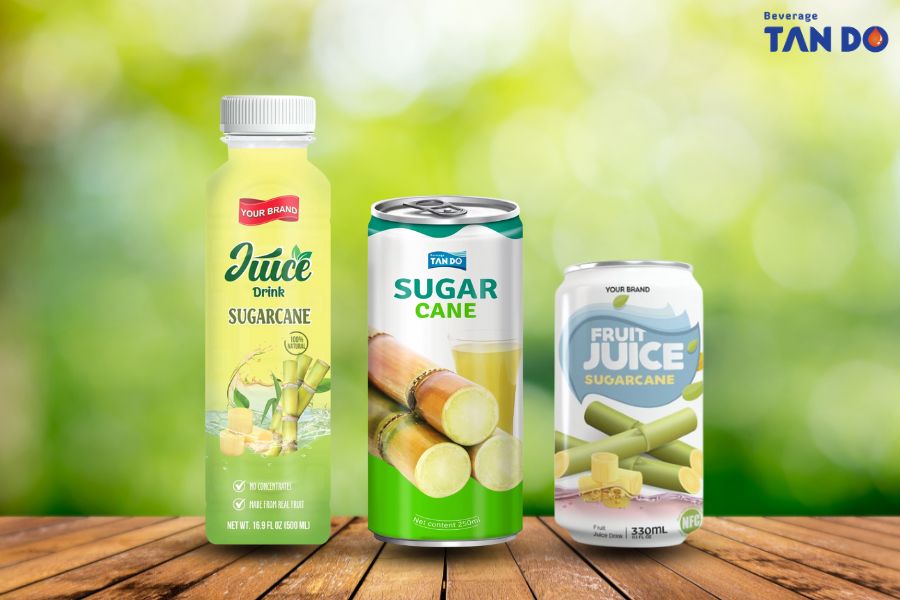

In many Asian countries, including Vietnam, sugarcane juice is a popular drink known for its energy-boosting and hydrating qualities. For beverage brands, juice cane represents both a traditional ingredient and a modern functional drink base that appeals to health-conscious consumers.
In practical business terms:
- Product flexibility: Juice cane can be positioned as a pure sugarcane beverage, a canned juice SKU, or used as a juice cane sugar base in teas, sodas, or boba cane drinks.
- Origin story: “Made with Vietnamese sugarcane” immediately communicates natural, traceable, and exotic origins.
- Supply chain advantage: Brands can source sugarcane juice directly from Vietnam — either as bulk ingredient, private-label product, or ready-to-fill format — ensuring freshness and cost efficiency.
In short, juice cane from Vietnam delivers both storytelling and substance — a natural, plant-based ingredient that aligns with the global shift toward clean label and sustainable beverages.
Juice Cane Nutrition Facts
Sugarcane is typically enjoyed in a few different ways — freshly cut into small chewable pieces, sliced into hand-held sticks, or pressed into juice. To understand its nutritional composition accurately, most scientific analyses focus on sugarcane juice, since it represents the most common form of consumption.
According to various food composition studies, 28 grams (about 1 ounce) of pure sugarcane juice provides approximately:
- Calories: 113 kcal
- Carbohydrates: 25.4 g
- Protein: 0.2 g
- Fat: 0.66 g
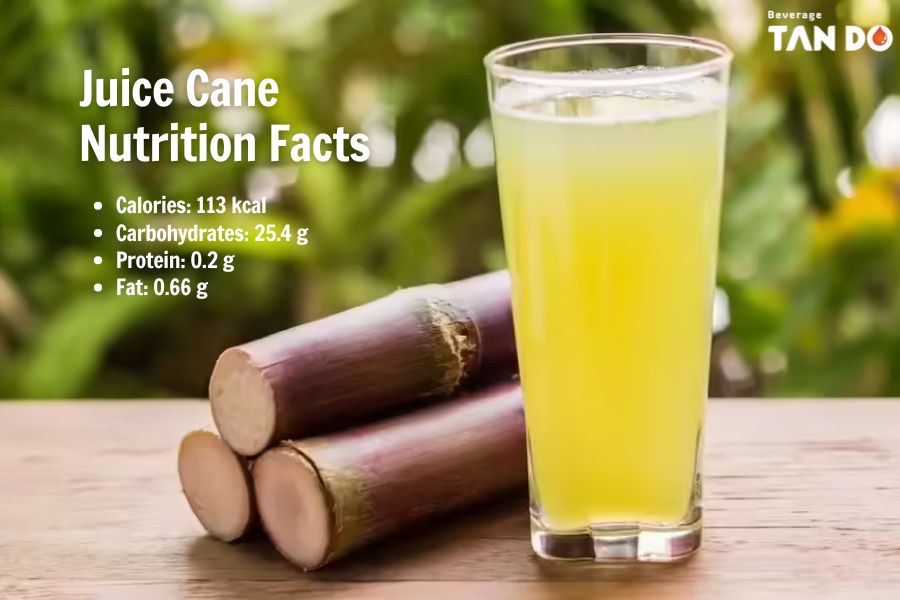

While sugarcane juice is primarily a source of natural carbohydrates, it also contains trace minerals such as iron, magnesium, calcium, and potassium, along with small amounts of Vitamin B1 (thiamine) and Riboflavin (Vitamin B2). These nutrients contribute to hydration, muscle function, and overall energy metabolism.
Its low fat content and absence of cholesterol make juice cane a naturally clean energy drink — perfect for brands looking to position products as wholesome, plant-based, and functional.
Health Benefits of Sugarcane Juice
For beverage brands communicating to wholesalers/distributors/retailers, being able to articulate credible health or functional benefits (while staying compliant) is an asset. Here are some of the beneficial attributes linked to juice cane:
Rapid Energy Source
Rich in natural carbohydrates, juice cane provides quick and sustained energy. Studies suggest that consuming sugarcane juice post-exercise aids glycogen restoration, making it an excellent natural base for “refreshing energy” drinks.
Hydration & Electrolyte Support
Vietnamese sugar cane drink is often consumed to replenish fluids and minerals in hot climates. Its small amounts of potassium and magnesium help support hydration and electrolyte balance — ideal for summer beverages and RTD functional drinks.
Antioxidant & Phytochemical Activity
Some research points to sugarcane juice containing phenolics, flavonoids and other antioxidant compounds which may help counter free-radical damage. While this does not mean “juice cane cures disease”, it allows drink brands to include wording such as “contains naturally occurring phenolics” or “plant-based extract”.
Natural Micronutrients
Though not high in micronutrient density, juice cane does contain small amounts of iron, magnesium, calcium and B-vitamins. These can support marketing messages like “naturally contains minerals”.
Important Cautions
It is essential to include realistic messaging and avoid making unsubstantiated health claims. Key cautions:
- Sugarcane juice is high in natural sugars and can spike blood sugar — not advisable for people with diabetes without moderation.
- Some consumers may assume “natural” means “low sugar” — this is incorrect in this case.
- Hygiene and processing matter: fresh juice outside controlled facilities can carry risk.
- Regulatory compliance in each market needs careful review (e.g., claiming “immune boosting” can trigger supplement classification).
For a drink brand using juice cane as an ingredient, the health story may be something like: “Made with natural sugarcane extract, delivering plant-based sweetness and naturally occurring minerals” — but sugar content must still be disclosed.
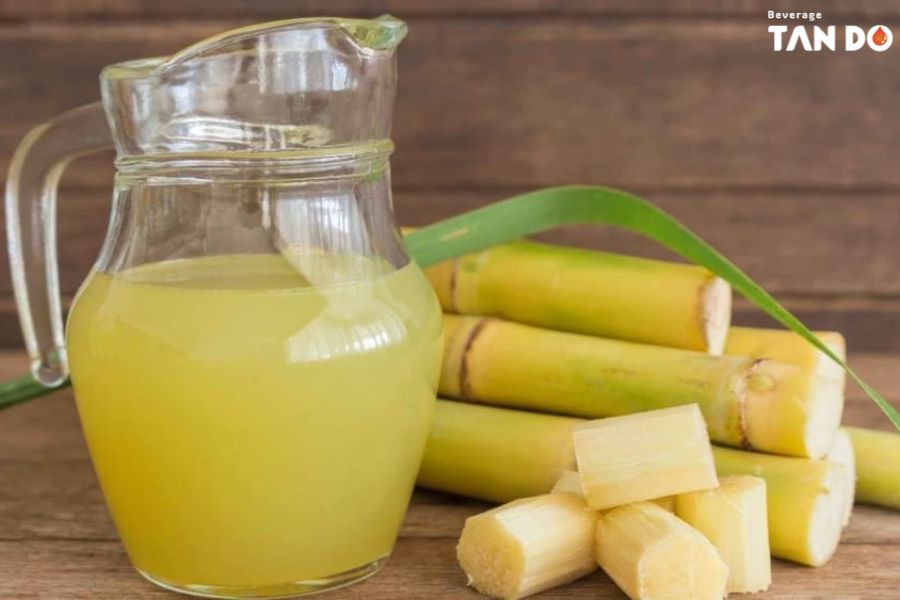

Inside Vietnam’s Sugarcane Juice Production: From Field to Factory
From a sourcing and manufacturing perspective, understanding the supply chain and processing steps for juice cane in Vietnam is critical. Beverage brands and distributors should evaluate sourcing partners based on these steps:
Cultivation & Harvesting
Sugarcane in Vietnam is mainly grown in southern provinces like Tien Giang, Tay Ninh, and Can Tho, where the tropical climate and fertile soil support high yields. In the 2023–24 season, sugarcane production reached about 6.79 tonnes per hectare, one of the highest in ASEAN (TTWTO VCCI)
Farmers often use high-Brix varieties to ensure sweeter, juicier cane and maintain consistent harvest schedules for steady supply. These favorable growing conditions make Vietnam juice cane a reliable ingredient for beverage production.
Transportation & Pre-Processing
Speed matters in sugarcane processing. Once harvested, the cane must be transported quickly to preserve sugar levels and reduce microbial risk. Vietnam’s compact logistics network gives it an edge — farms and processing sites are often close together.
Pre-processing includes washing, peeling, and cutting. For canned sugarcane or frozen formats, the juice or cane pieces are sorted by Brix value and prepped for export.
Juice Extraction, Filtration & Treatment
At processing sites, canes are crushed or pressed to extract juice, which is then filtered to remove bagasse and impurities.
Depending on export requirements, the juice may be pasteurized, cold-pressed, or frozen. For a beverage brand working with OEM/ODM, ensure your supplier offers consistent Brix, microbial control, and documentation (e.g., HACCP, ISO, GlobalGAP).
Packaging & Product Formats
Vietnamese producers offer bulk juice cane, canned sugar cane drinks, and even peeled sugarcane sticks for retail or on-site juicing. As a beverage brand, you can choose between:
- Ingredient supply (juice cane concentrate or frozen juice)
- Private-label sugarcane juice Vietnam beverage line
- Co-branded product highlighting origin (“Vietnamese sugarcane drink”)
Quality Assurance & Traceability
Vietnam’s sugarcane industry is rapidly improving its traceability standards. Reputable suppliers now provide full documentation — from farm origin and harvest date to laboratory tests for sugar levels, microbial load, and heavy metals. Brands are encouraged to audit facilities and verify product consistency across seasons.
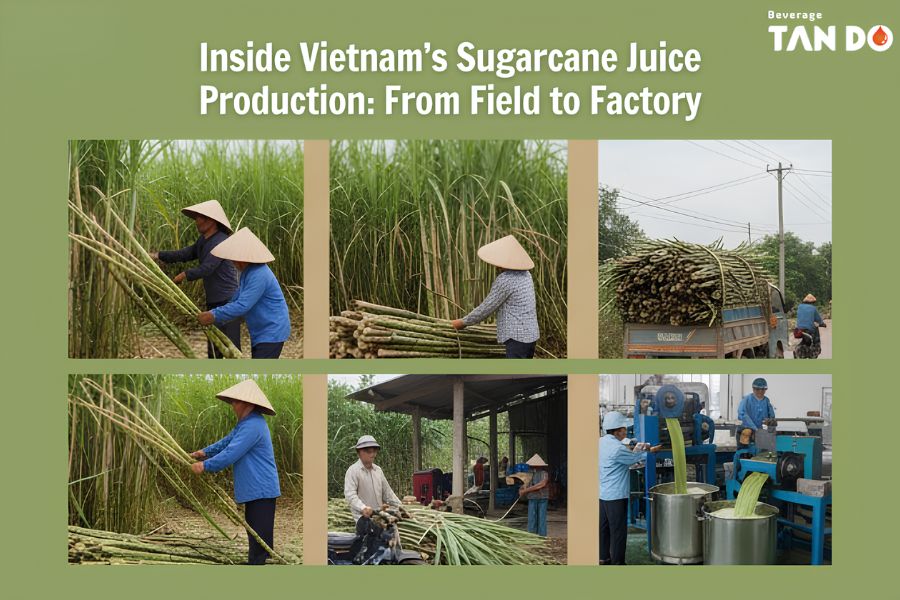

Why Vietnam Juice Cane is A Profitable Opportunity for Drink Brands
Having covered what juice cane is, its nutrition/benefits, and the production path in Vietnam, let’s address why this is a business-opportunity for beverage brands:
Abundant Supply & Competitive Cost
With more than 120,000 hectares of sugarcane farmland, Vietnam remains one of Southeast Asia’s top producers. The 2022/23 season saw 9.645 million tons processed (up 28% year-on-year) and a 14% rise in harvested area to ~142,000 ha (Vietnam Agriculture).
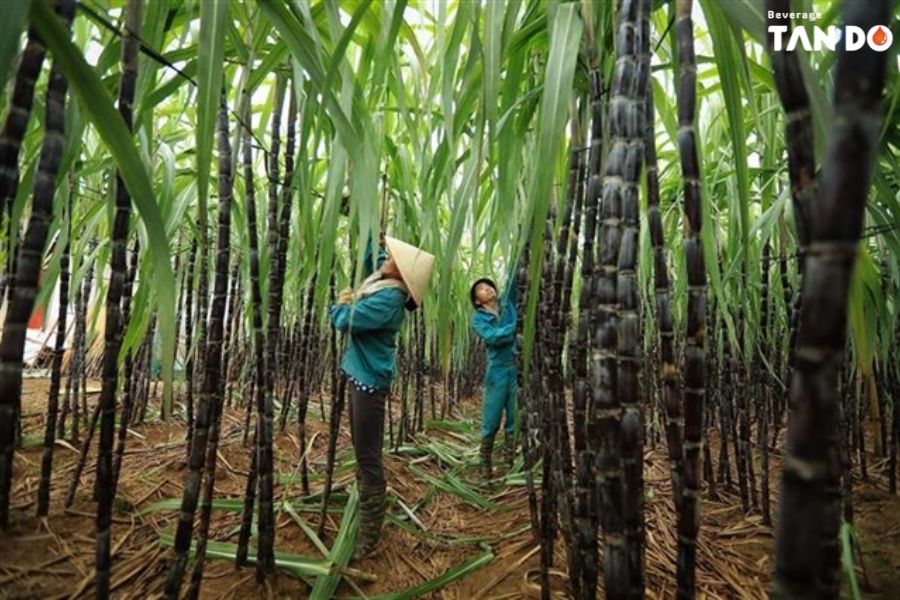

This steady, scalable supply supports reliable juice cane exports and keeps raw-material costs competitive. Additionally, Vietnam’s affordable land and labor rates give global beverage brands a clear cost advantage when sourcing canned sugarcane or pure sugarcane juice from the region. (Vietnam Agriculture)
Origin Story & Differentiation
For global beverage brands, origin is a story. “Made with Vietnamese sugarcane juice” resonates as exotic, authentic, and natural.
Consumers—especially in premium/functional segments—look for traceability, plant-based sourcing, and unique flavour profiles. Using juice cane from Vietnam allows you to differentiate versus generic sweeteners or commodity sugar. This can create a premium price point or a stronger brand narrative.
Export-Ready Ecosystem
Vietnam’s exports of sugarcane/sugar products are increasing. For example, the export value of commodity group “Sugars and sugar confectionery” rose by ~33 % between 2021 and 2022. Export shipments grew 36% year-on-year in 2023–24.
This signals that logistics, export documentation, cold chain or frozen supply for sugarcane/juice cane already function — reducing risk for beverage brands sourcing globally.
Cost Control & Supply Chain Efficiency
Vietnam’s integrated sugarcane zones mean shorter transport routes and lower logistics costs. By sourcing juice cane from Vietnam, you gain advantages such as:
- Shorter supply chain from farm to processing (especially Vietnam south region)
- Potential bulk sourcing agreements with Vietnamese producers/exporters
- Leverage Vietnam’s improving productivity (yield/ha) and mechanization to reduce raw-material cost. TTWTO VCCI
These factors combine to improve manufacturing margin, support private-label strategy, or enable pricing flexibility for retail/distributor partners.
Health, Clean Label & Sustainability Trends
Consumers globally are moving toward: plant-based ingredients, minimal processing, transparency and traceability. Juice cane fits this trend: it is a plant extract, less processed than refined sugar, allows origin storytelling, and can be positioned under a “natural sweetener + flavour” umbrella.
For beverage brands looking to upgrade from generic sugar or high-fructose sweeteners, juice cane offers a compelling pivot.
Choose Tan Do — Your Truster Partner for Premium Vietnamese Sugar Cane Juice
Having identified juice cane and the opportunity in Vietnam, the next question is: whom to partner with? For brands pursuing OEM/ODM, private label or bespoke formulation using juice cane, Tan Do Beverage offers a strong proposition.
Why Leading Beverage Brands Choose Tan Do:
- Manufacturing capability & experience: Tan Do specializes in beverage production with OEM/ODM/private label services, meaning you can leverage our infrastructure, formulation expertise and supply-chain relationships.
- Integrated sourcing of caned juice: With access to Vietnam’s sugarcane raw material base and processing partners, Tan Do can help import juice cane or integrate it into your product formula, ensuring quality and origin story.
- Quality assurance & export readiness: As you target global wholesale/distributor/retail channels, the manufacturing partner must meet international standards (HACCP, ISO, packaging, export documentation). Tan Do aligns with those requirements and supports private-label clients.
- Customization and brand control: Via private-label or co-branded models, you can use Tan Do to produce beverage products featuring juice cane, with packaging and branding tailored to your market. This allows you to capture the margin and build your brand.
- Supply chain optimization: By working with Tan Do, you can benefit from optimized logistics: Vietnamese sugarcane sourcing, processing, bottling/canning, export — reducing your overhead of managing multiple suppliers and ensuring traceability.
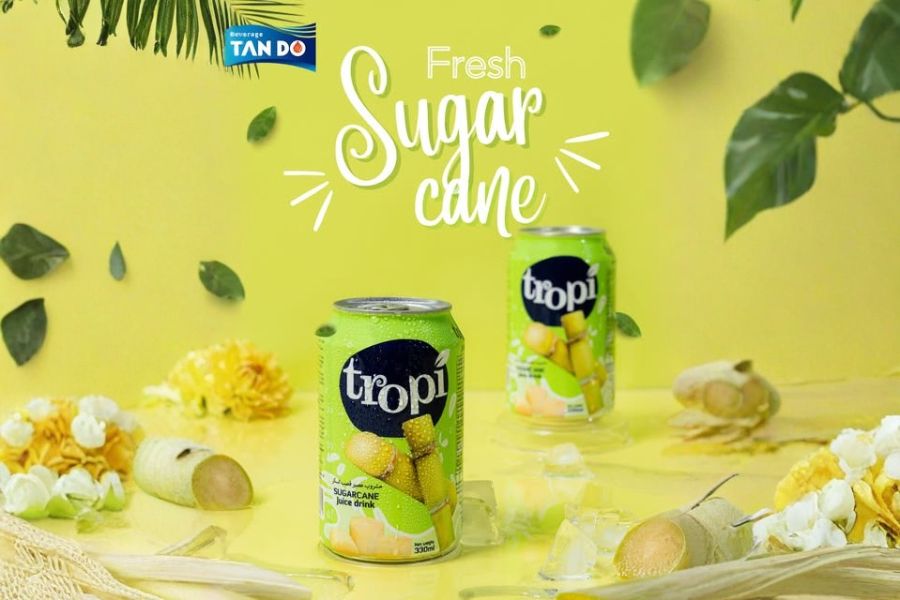

Sum Up
Investing in juice cane from Vietnam is more than a sourcing move — it’s a strategic growth opportunity for drink brands, distributors, and retailers. You’ll gain access to a dependable raw-material base, stay ahead of clean-label and origin-driven trends, and leverage OEM/ODM expertise from Tan Do Beverage to create products that truly stand out in global markets.
Ready to turn this opportunity into your next success story? Partner with Tan Do today and bring the refreshing Vietnamese sugarcane juice taste to shelves worldwide.




